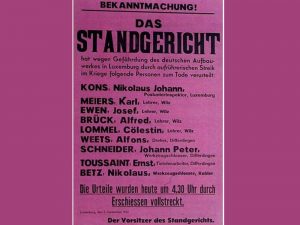The German occupation meant the immediate end of Luxembourg’s independence. In July-August 1940, the Grand Duchy was placed under direct German administration, and all vestiges of the Luxembourg state were abolished.
Through intensive propaganda, the occupiers tried to convince Luxembourgers to support the Nazi regime.
With the exception of a few collaborators, the Luxembourg population never submitted. On the contrary, the longer the occupation lasted, the more the Nazis repressed the Luxembourg identity, which intensified the Luxembourg resistance.
In 1941, about ten resistance organizations were formed to fight (individually) against the occupying forces. They organized, for example, the escape of politically persecuted people, supported Luxembourg’s draft dodgers after the introduction of forced recruitment in the summer of 1942, etc. They even successfully launched a campaign against the occupation. They even supported a successful general strike against the regime, which mobilized the whole country. As a result, more than 200 people were arrested, and about 20 were executed.
However, the active resistance would have been much less successful in its activities without the general population’s support. Some courageous patriots also made their way abroad to join the Allied fighting troops and thus contributed to the country’s liberation.
